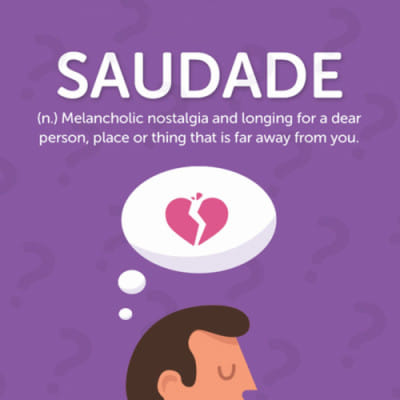Lost In Translation

Language remains the most beautiful of our creations. To be well-versed in all the languages of the world is a dream far too magnificent, but it was in that spirit that I decided to look up some of the most beautiful untranslatable words from different languages.
RUSSIAN
Toska: Vladimir Nabokov described this as a word with shades. In its lighter essence, toska refers to boredom or restlessness, which may deepen to a muffled yearning of the soul – a kind of nostalgia or love-sickness – for something unknown. In a deeper and more melancholic context, it means intense and inexplicable spiritual pain.
PORTUGUESE
Saudade: An inspiration behind the mournful Portuguese Fado music, saudade also refers to yearning, but in this case of something loved and lost.
Cafuné: Cafuné is a Brazilian Portuguese word that stands for one of the most mundane and casually intimate acts of everyday life – running our fingers, with affection, through someone else's hair.
GERMAN
Fernweh: The essence of this word is somewhat similar to the idea of wanderlust, the longing to travel and experience different places. What makes it more poetic is that it stands for the homesickness we feel for places we have never seen.
Habseligkeiten: Chosen as the most beautiful word in German, it is the simple, modest possessions of a child or a homeless person, in contrast to the worldly belongings of the wealthy.
DUTCH
Gezellig: A Dutch loanword referring to the comfortable time spent with loved ones in warm, cosy places.
FRENCH
L'esprit d'escalier: Literally translated, this means “staircase wit”. Any guesses?
In the 18th century, a French philosopher called Diderot was able to think of a smart enough retort for an argument only after he had walked down the stairs. And thus he coined this phrase which, similar to the German word treppenwitz, describes the annoying instance of coming up with smart or witty comebacks to disagreements after it's too late.
Flâner: Paris is said to be one of the most beautiful places in the world. Despite the famous museums and designer stores, what Parisians and tourists love to do the most is to aimlessly wander the streets, soaking in the culture and beauty that seems to reside in the very air there. In the 19th century, the literary society of Paris termed this leisurely act as flâner, and the pedestrians doing it as flâneurs.
TURKISH
Gumusservi: An image that crosses the mind of almost every poet, writer or musician at least once – that of silver moonlight shining on the surface of water.
SPANISH
Duende: You know that inexplicable feeling of being moved or transfixed by a breathtaking work of art? The mysterious power it can hold over those who see it? That is what it means, deriving from an older meaning of sprite-like entities that possessed humans and forced them to be in awe of the beauty of nature.
JAPANESE
Wabi-Sabi: This is a common concept in Japanese culture that focuses on finding the beauty in life's imperfections and its natural process of “growth and decay.”
FARSI
Moosh bokhoradet: And finally there are the Persians, who seem to have quite amusing ways of expressing love. Literally translated, this phrase means “a mouse should eat you.” The sentiment behind it is to tell someone that they're adorable, such as to kids. It can also be ironically put, such as when we sarcastically say “Oh, you're cute” to someone acting silly.
The beautiful thing about language is that it gives shape to our dreams and emotions. What's even more amazing is how these words take different shapes in different dialects, and yet portray the same emotions across continents.
Sarah Anjum Bari is a ravisher of caffeine and prose, with a heart that lives in Parisian cafes. Reality checks to be sent in at [email protected]

 For all latest news, follow The Daily Star's Google News channel.
For all latest news, follow The Daily Star's Google News channel. 



Comments